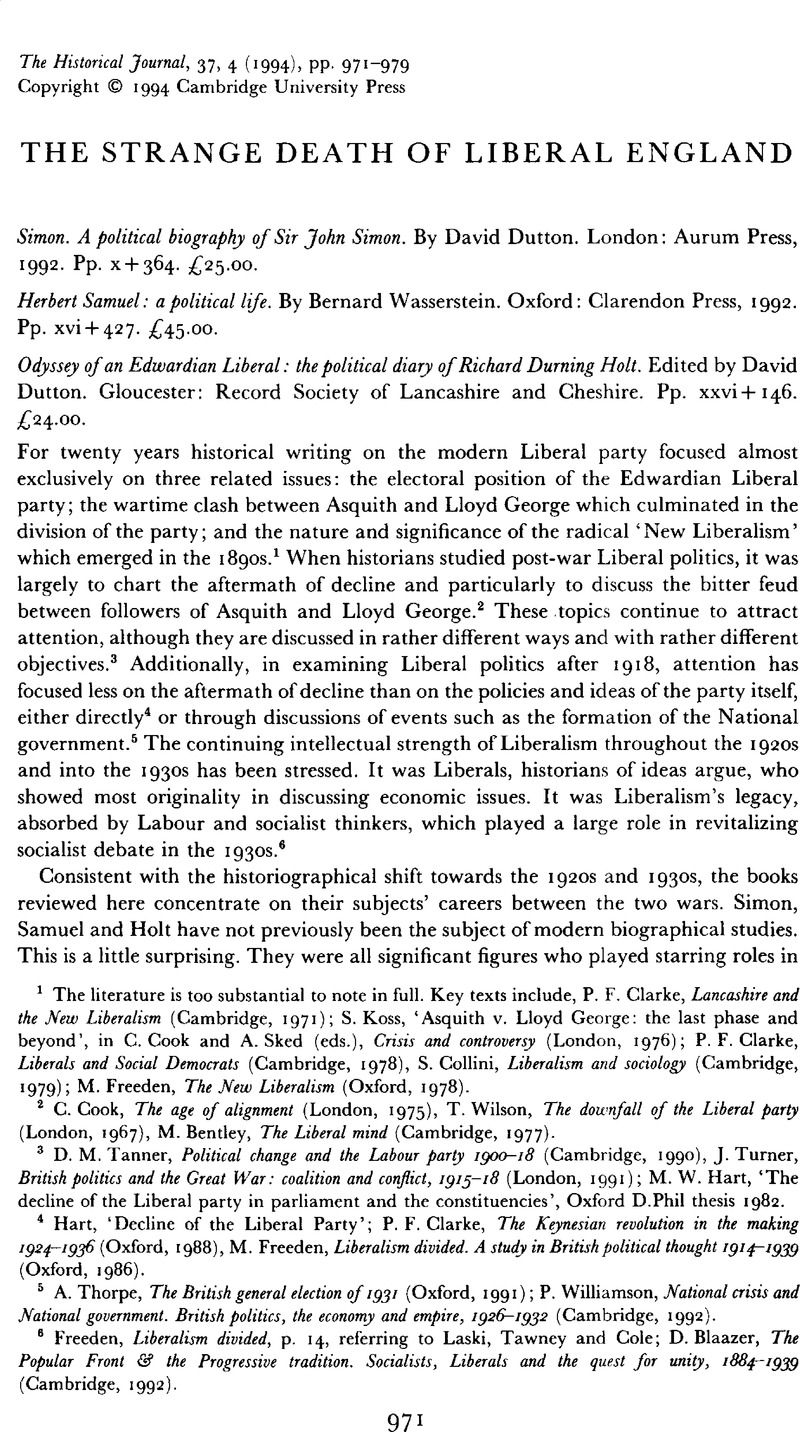Article contents
The strange death of Liberal England
Published online by Cambridge University Press: 11 February 2009
Abstract

- Type
- Review Articles
- Information
- Copyright
- Copyright © Cambridge University Press 1994
References
1 The literature is too substantial to note in full. Key texts include, Clarke, P. F., Lancashire and the New Liberalism (Cambridge, 1971)CrossRefGoogle Scholar; Koss, S., ‘Asquith v. Lloyd George: the last phase and beyond’, in Cook, C. and Sked, A. (eds.), Crisis and controversy (London, 1976)Google ScholarClarke, P. F., Liberals and Social Democrats (Cambridge, 1978)CrossRefGoogle Scholar, Collini, S., Liberalism and sociology (Cambridge, 1979)Google Scholar; Freeden, M., The New Liberalism (Oxford, 1978).Google Scholar
2 Cook, C., The age of alignment (London, 1975)CrossRefGoogle Scholar, Wilson, T., The downfall of the Liberal party (London, 1967)Google Scholar, Bentley, M., The Liberal mind (Cambridge, 1977).Google Scholar
3 Tanner, D. M., Political change and the Labour party 1900–18 (Cambridge, 1990)CrossRefGoogle Scholar, Turner, J., British politics and the Great War: coalition and conflict, 1915–18 (London, 1991)Google Scholar; Hart, M. W., ‘The decline of the Liberal party in parliament and the constituencies’, Oxford D.Phil thesis 1982.Google Scholar
4 Hart, , ‘Decline of the Liberal Party’Google Scholar; Clarke, P. F., The Keynesian revolution in the making 1924–1936 (Oxford, 1988)Google Scholar, Freeden, M., Liberalism divided. A study in British political thought 1914–1939 (Oxford, 1986).CrossRefGoogle Scholar
5 Thorpe, A., The British general election of 1931 (Oxford, 1991)CrossRefGoogle Scholar; Williamson, P., National crisis and National government. British politics, the economy and empire, 1926–1932 (Cambridge, 1992).Google Scholar
6 Freeden, , Liberalism divided, p. 14Google Scholar, referring to Laski, Tawney and Cole; Blaazer, D., The Popular Front & the Progressive tradition. Socialists, Liberals and the quest for unity, 1884–1939 (Cambridge, 1992).CrossRefGoogle Scholar
7 Williamson, , National crisis, ch. 5.Google Scholar
8 Jones, H., ‘The Home Office and working conditions, 1914–40’, London PhD thesis 1983, p. 104Google Scholar. The counter-revisionist case on appeasement is fully elaborated in Parker, R. A. C., Chamberlain and appeasement. British policy and the coming of the second world war (London, 1993)CrossRefGoogle Scholar, and Adams, R. J. Q., British politics and foreign policy in the age of appeasement 1935–39 (London, 1993).CrossRefGoogle Scholar
9 Misnamed the Liberal Industrial Enquiry by Dutton (p. 83). The Liberals avoided Dutton's version because of the unfortunate acronym.
10 Thorpe, 1931, p. 79, Williamson, , National crisis, pp. 298–9, 308–9.Google Scholar
11 Williamson, , National crisis, pp. 335–6.Google Scholar
12 In particular Matthew, H. C. G., McKibbin, R. I. and Kay, J. A., ‘The franchise factor in the rise of the Labour party’, EHR, XCI (1976), 747–9.CrossRefGoogle Scholar
13 An approach outlined in McKibbin, R. I., ‘Class and conventional wisdom: the Conservative party and the ‘public’ in inter-war Britain’, in his The ideologies of class (Oxford, 1990).Google Scholar
14 Wilson, D., Gilbert Murray (Oxford, 1987), pp. 76–7, 391–2.Google Scholar
15 Clarke, , Liberals and social democrats, pp. 237–8.Google Scholar
16 Freeden, , Liberalism dividedGoogle Scholar, Blaazer, , Progressive tradition.Google Scholar
17 Tanner, , Political change, pp. 432–42Google Scholar; Pimlott, B., Labour and the left in the 1930s (Cambridge, 1977). PP. 198, 202–3.CrossRefGoogle Scholar
18 Tanner, D. M., ‘Work, wages and unemployment: the political economy of the Edwardian Labour party 1900–14’, in Luciani, J. et al. (eds.), Unemployment in the making (forthcoming)Google Scholar, Stewart, J., ‘Ramsay MacDonald, the Labour party and child welfare, 1900–1914’, Twentieth Century British History, IV, 2 (1993).Google Scholar
19 Thorpe, A., ‘The industrial meaning of gradualism: the Labour party and industry from 1918 to 1931’Google Scholar, unpublished paper; Garner, R. W., ‘Ideology and electoral politics in Labour's rise to major party status 1918–31’, Manchester PhD thesis 1988, pp. 51–65Google Scholar. See also Tanner, D. M., ‘British and European Socialism’, Twentieth Century British History (forthcoming) for a fuller commentary on the literature.Google Scholar
20 Durbin, E., New Jerusalems. The Labour party and the economics of democratic socialism (London, 1985).Google Scholar
21 Newman, M., Harold Laski. A political biography (London, 1993), p. 362CrossRefGoogle Scholar, Wright, A. W., G. D. H. Cole and socialist democracy (Oxford, 1979)Google Scholar and his R. H. Tawney (Manchester, 1987). Cf. Howe, S., Anti-colonialism in British politics. The left and the end of empire 1918–1964 (Oxford, 1993).CrossRefGoogle Scholar
22 Dickie, M., ‘Town patriotism and the rise of Labour 1918–1939’, Warwick PhD thesis 1987, ch. 4Google Scholar; Broughton, J., ‘Working class politics in Birmingham and Sheffield’, Warwick PhD thesis 1987, ch. 7Google Scholar; Berger, S., ‘The Labour party and the SPD: a comparison of their structure and development and a discussion of the relations between the two movements, 1900–1933’, Oxford DPhil thesis 1991, pp. 298–325.Google Scholar
23 Brooke, S., Labour's war. The Labour party during the second world war (Oxford, 1992)CrossRefGoogle Scholar, Jefferys, K., ‘British politics and social policy during the second world war’, H.J. XXX, 1 (1987).Google Scholar
24 Hobhouse, L. T., Democracy and reaction (1903)Google Scholar, ch. 9 and Liberalism (1911), chs. 7–8; Hobson, J. A., The crisis of Liberalism (1909), ch. 4.Google Scholar
- 1
- Cited by


